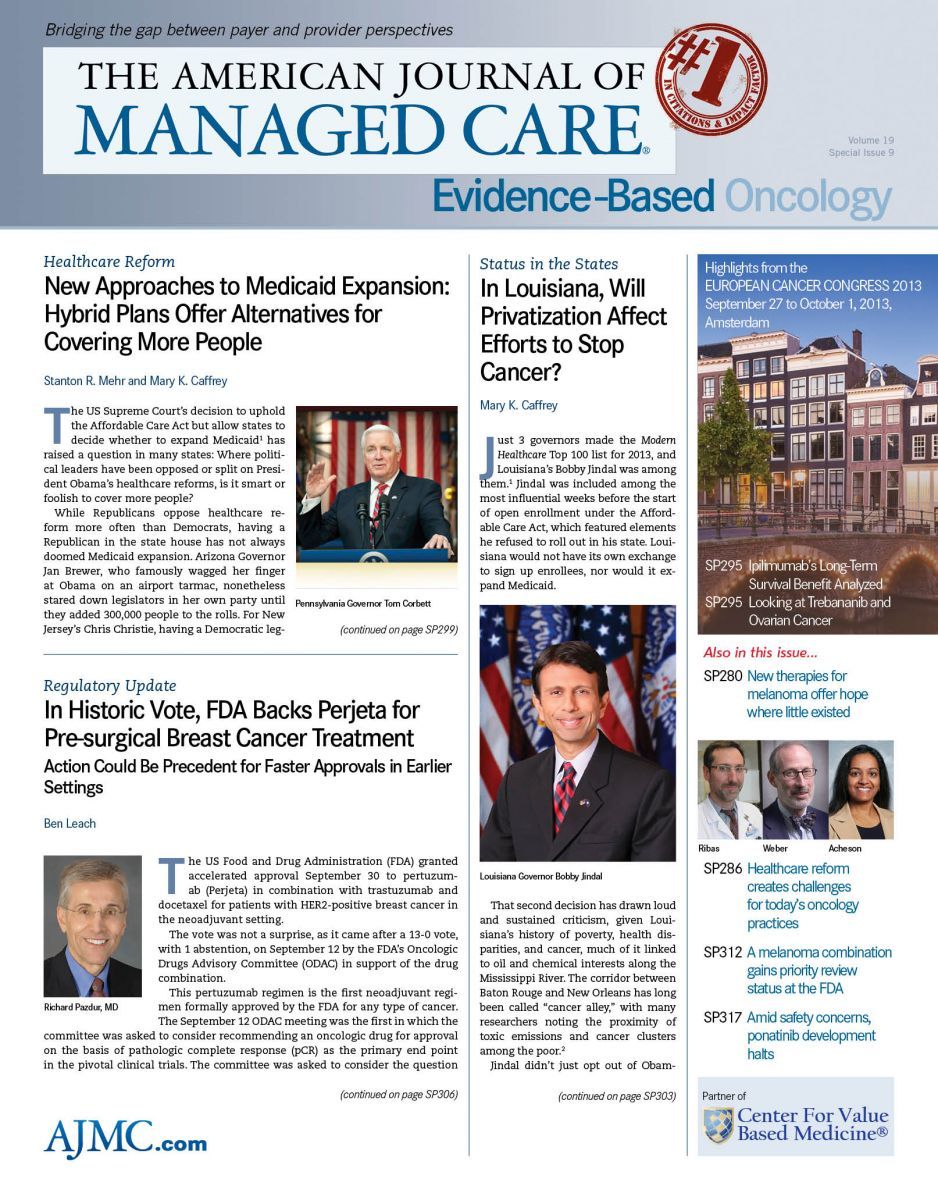- Center on Health Equity & Access
- Clinical
- Health Care Cost
- Health Care Delivery
- Insurance
- Policy
- Technology
- Value-Based Care
Pooled Analysis Reinforces Long-Term Survival Benefit With Ipilimumab
European Cancer Congress 2013
Results from a pooled analysis of data from 12 studies have demonstrated a long-term survival benefit that extends through at least 10 years for patients with advanced melanoma treated with ipilimumab (Yervoy).
The results were announced by the drug’s manufacturer Bristol-Myers Squibb on September 27 and presented the next day at the 2013 European Cancer Congress in Amsterdam. This study, which included 2 phase III trials, 8 phase II trials, and 2 retrospective trials, represents the largest overall survival (OS) analysis to date for patients with advanced or unresectable metastatic melanoma treated with ipilimumab.
The analysis included both patients who were previously treated (n = 1257) and previously untreated (n = 604).1 “This pooled analysis is encouraging, particularly when considering that metastatic melanoma is one of the most aggressive forms of cancer and historically, average survival was just 6 to 9 months,” said F. Stephen Hodi, MD, Department of Medicine, Harvard Medical School, Dana-Farber Cancer Institute, in a statement.
In the 1861 patients treated with ipilimumab, median OS was 11.4 months (95% CI: 10.7—12.1). Researchers noted a distinct plateau in OS at year 3 that extended through year 10, independent of line of therapy, ipilimumab dose, or maintenance therapy. The 3-year OS rates were 22%, in the entire study population, 26% for treatmentnaïve patients, and 20% for previously treated patients. The authors of the study wrote that these OS data should be considered as a benchmark for future melanoma therapies, as they represent a large benefit in a difficult-to-treat disease.
“This pooled analysis reinforces the long-term survival data seen in the individual studies and provides additional insight into the overall survival of metastatic melanoma patients treated with Yervoy,” said Brian Daniels, senior vice president, global development and medical affairs, Bristol-Myers Squibb Company, in a statement. “The durability and consistency of long-term survival observed in this analysis is encouraging as we continue to advance the research and development of our immuno-oncology portfolio.”
In each of the trials in the analysis, patients received ipilimumab at different doses, with the majority of patients receiving 3 mg/kg (n = 965) or 10 mg/kg (n = 706) every 3 or 4 weeks. Most of the studies provided the option for eligible patients to receive ipilimumab retreatment or ipilimumab maintenance therapy. Safety data were not included in the analysis. Adverse events attributed to ipilimumab, which are typically mechanism (immune)-based, were managed in individual trials with protocol-specific guidelines, including dose interruption or discontinuation and the administration of systemic corticosteroids.
The FDA approved ipilimumab 3 mg/kg monotherapy in 2011 for patients with unresectable or metastatic melanoma. Ipilimumab is now approved in more than 40 countries. Reference
1. Schadendorf D, Hodi FS, Robert C, et al. Pooled analysis of long-term survival data from phase II and phase III trials of ipilimumab in metastatic or locally advanced, unresectable melanoma. Presented at: European Cancer Congress 2013 (ECCO-ESMO-ESTRO); September 27-October 1, 2013; Amsterdam, The Netherlands. Abstract 24.

Building Trust: Public Priorities for Health Care AI Labeling
January 27th 2026A Michigan-based deliberative study found strong public support for patient-informed artificial intelligence (AI) labeling in health care, emphasizing transparency, privacy, equity, and safety to build trust.
Read More
Ambient AI Tool Adoption in US Hospitals and Associated Factors
January 27th 2026Nearly two-thirds of hospitals using Epic have adopted ambient artificial intelligence (AI), with higher uptake among larger, not-for-profit hospitals and those with higher workload and stronger financial performance.
Read More
Motivating and Enabling Factors Supporting Targeted Improvements to Hospital-SNF Transitions
January 26th 2026Skilled nursing facilities (SNFs) with a high volume of referred patients with Alzheimer disease and related dementias may work harder to manage care transitions with less availability of resources that enable high-quality handoffs.
Read More
Specialty and Operator Status Influence Electronic Health Record Use Variation
January 22nd 2026Operators demonstrated specialty-specific differences in electronic health record efficiency, timeliness, and after-hours use, highlighting how workflow and training shape documentation behaviors across medical disciplines.
Read More

